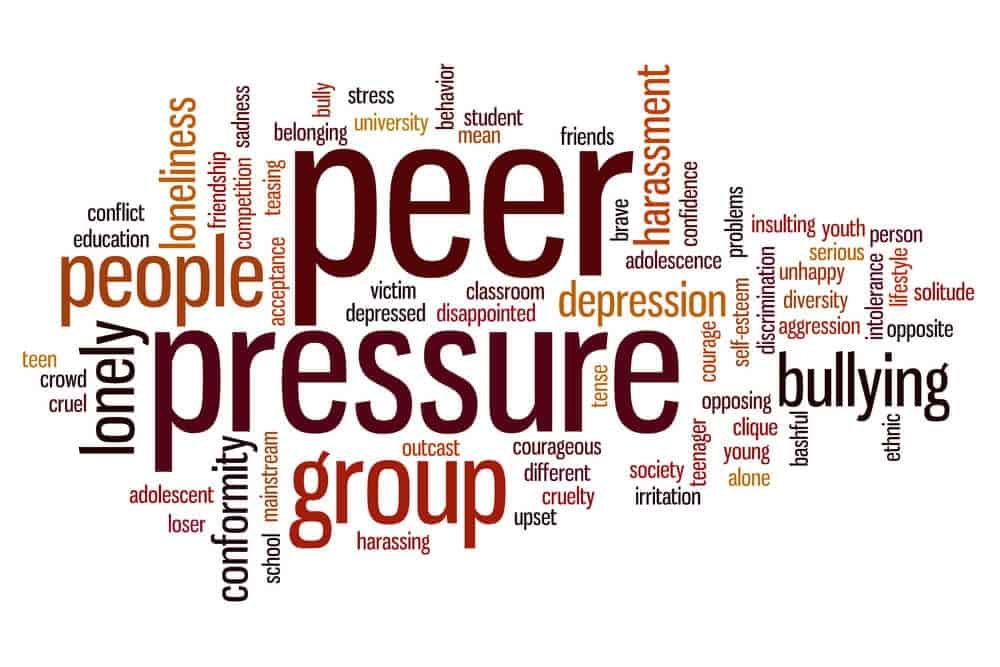
Drug Addiction & Peer Pressure
The teenage years are riddled with pressures from every angle. Pressure at school to complete homework and to get good grades. Pressure at home to be respectful, help around the house and to conform to the familial unit. Social pressure to fit in, to find their group of friends and to be liked. Unfortunately, peer pressure can be so persuasive that teens find themselves in a precarious situation – one that leads them to drug addiction.
Research on teen substance abuse has found that most first-time users of drugs and alcohol felt pressure from peer groups to try it. The desire to fit in and to be included is so strong that for many teens, this feeling overrides their strong sense of morals, ethics and beliefs. They feel conflicted, knowing that their parents and family may disapprove, yet wanting so desperately to be a part of something outside of their family. Depending upon the group and where its members place value, teens can easily alter their own belief system in order to conform to that of the group. In other words, if the friends are drinking alcohol, the teen may feel pressure to try it as well so as not to be the outcast or oddball.
Of course, peer pressure can work positively in a teen’s life as well. If a teen surrounds himself with positive, upstanding friends, he is more likely to follow suit to conform to their standards of behavior as well. Social learning theories define how teens learn from watching others. Psychologist Albert Bandura developed the idea of social learning theory in 1977 and stated that children learn by observing the behavior of people around them. Their observations influence their thoughts, emotions, and behavior. Although peers may not be specifically bullying and encouraging a teen to try a drug or alcohol, the simple fact of association encourages teens to participate and to follow the crowd.
Peer groups are very important to teens during this time in their lives. They provide essential emotional support, can be a resource for information, and may even be the voice of reason when necessary. Friends help teens to understand who they are, how they fit into the world and may confirm their beliefs. Because peers play such an important role in a teen’s life at this time, even greater than parents and caregivers, it is so critical that they are attracted to and join positive, supportive and consistent peer groups.
Unfortunately, if a teen may already be struggling with mental health issues, they may gravitate towards those teens with whom they can relate. Maybe they find commonality with others who experience anxiety, depression or eating disorders? What if your teen has experienced a traumatic or very stressful event such as violence, death or abuse? They may find comfort in hanging out with other teens who have experienced similar events and emotions. Since the desire to fit in so strong during adolescence, teens may not feel that they fit in with others who don’t have the same thoughts and therefore, may feel rejected and like an outsider, adding to the feelings of inadequacy and discomfort. They feel themselves when they surround themselves with like-minded teens who can relate to the thoughts that are rattling around in their brains, even if it isn’t functioning properly.
Peers are the lifeline for a teen as they transition between child and adult. They rely on them wholeheartedly and can be crushed easily when they feel slighted or abandoned. They are highly influenced by their peers and although the pressure may not be apparent or direct, teens tend to feel pressure to conform at all times. They want to be included even if the activity may be risky, push them out of their comfort zone or possibly be illegal.
When a peer says, “just try it” or “it won’t hurt you”, a teen who may be struggling with relationships or self-image may be susceptible to the pressure to please others. While some teens may be able to resist, disregarding any pressure that may be placed, others cannot and will fall victim to peer pressure. For those who struggle with mental health issues, just “trying it” or casual use may very well be the trigger that launches them into full-fledged distress, abuse and addiction. While it may be uncommon for teens to be strong-armed into participating in dangerous activities, it is more common for them to want to please their friends or to be “cool”.
It is the internal pressure which encourages them to just try it. Then, unfortunately, as they realize that the substance brings them a sense of happiness and euphoria, it is no longer the pressure from peers or from internal pressure which pushes them to take that next hit, pop another pill or take that drink. Teens experiencing a mental health issue may realize that the substance provides them with an escape from the emotional and physical symptoms that they are experiencing. At that point, it is no longer the peer pressure driving them towards the drug or alcohol but rather the body’s craving for that euphoric feeling. When the addiction sets in, it is no longer a casual drink or hit, it is a physical need that pushes a teen suffering from mental health issues further into the throes of their addiction and worsens the symptoms of their disorder.
Addiction cannot be controlled. Defined as preoccupation, intoxication, and withdrawal, addiction is a chronic relapsing disorder. With frequent use and abuse, physical changes occur to the brain, eliminating a person’s self-control and interfering with a teen’s ability to resist the intense urges for the drug or alcohol. What started out as a simple influence by peers can become an intense, uncontrolled addiction that will require the attention and support of medical professionals at a treatment center such as those at BEACHSIDE Treatment Center. Teens who experience addiction usually display signs and symptoms of other mental health issues which will also be addressed as trained staff work to relieve their body from the dependence of the substance and manage the withdrawal symptoms that follow from the process.
Some things to look for if you suspect your teen may have been influenced by peer pressure and is now faced with addiction:
Changes in appetite or sleep patterns. Depending upon the substance, changes may be erratic and distinct. For example, those abusing marijuana may sleep more and have an increased appetite. On the other hand, a teen who is using amphetamines may need to sleep and eat less often.
Withdrawal from social activities or things that they once loved. Teens who have transitioned from a casual user to an addict will display a diminished desire to participate in activities that they once loved. Whether it was sports or art or music, they will no longer be interested because their thoughts are consumed by their desire for the substance of choice.
Sudden changes in relationships. We have discussed how important friends and peer groups are at this critical time in a teen’s life. If suddenly your teen changes friend groups or no longer associates with those who had a positive influence, this may be a sign that they have been influenced by peer pressure and may have an addiction problem. The “new” friends may be better able to obtain the drug or alcohol or the teen may feel more comfortable surrounded by those who also are using.
Suddenly secretive. Your once open, trustworthy teen is now sneaking around, hiding things in their room, or resorting to stealing money in order to get their next fix. Again, pressure from peers may force them to participate in activities and take risks that they may not have otherwise done without a different group of friends or without the influence of drugs and alcohol.
Change in personality. Of course, personality changes and mood swings are a normal occurrence during adolescence. However, it is when those changes appear out of sorts even for a moody teen that your child may be experiencing an addiction. Increased hyperactivity and then sudden crashes into sadness or despair are typical with addiction depending upon the drug of choice. Extreme cases of moodiness may also be symptoms of the underlying mental health disorder.
Dramatic changes in physical appearance. At this critical time in a teen’s life, many teens become very concerned about their physical appearance, partly due to the need and pressures to fit in. However, when the teen suddenly shows no concern for their appearance, possibly neglecting even basic hygiene, this may be a sign that they have an addiction to drugs or alcohol.
Many times, unsuspecting parents believe that their teen is resistant to these feelings and pressures. They want to believe that they have laid a solid foundation for their children to know right from wrong and to be able to avoid situations that put them at risk. However, as well-intentioned as parents are, they cannot completely shield their children from the desire to fit in, the pressures to conform and the influences of others, especially if they are faced with mental health challenges as well.
As parents and caregivers, you can equip your child with as many defenses to battle against peer pressure as possible. Teach them to evaluate their friendships to determine if the ‘friends’ they have selected could have a positive or negative influence on their life. While they may not listen to your recommendations or suggestions about who they should befriend, if they have the appropriate relationship skills to ask the right questions themselves, they will certainly be in a better position to make the right choices.
Teens will stumble along the way in the quest to find their peer groups and to avoid peer pressure. Help them to understand that mistakes will happen, they may be disappointed in a friend or peer, or they make have to completely find a new group, but that it is okay. They want to surround themselves with those who will be supportive of their mental health issues, and although finding commonality is important in friendships, they don’t have to revolve around negativity, depression or mental health issues.

Peer pressure can, in fact, work to help a teen with an addiction problem. Positive influences and support from peers can be just as impactful in a teen’s life as the negative influences were. When friends believe in them, demonstrate care and concern, they are more likely to push forward with their treatment towards long-term success in recovery. During treatment at an addiction treatment center like BEACHSIDE Treatment Center, teens will participate in group therapy, engaging with other teens who may be faced with similar challenges and disorders. By surrounding themselves with a support system of peers, the pressure to conform will once again rise up to encourage teens to follow the path of being clean and sober and to address the mental health issues which led them down the path to addiction in the first place.
If you suspect that your teen is being negatively influenced by peers and/or has developed an addiction to drugs or alcohol, get them the help that they need today. Contact their pediatrician for an evaluation and referral to a treatment center like Beachside – where they can receive the attention that they need to recover from their addiction and lead a productive, successful life.




